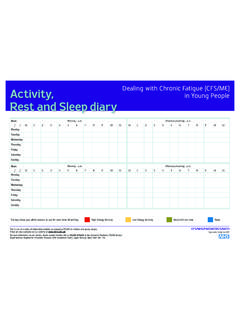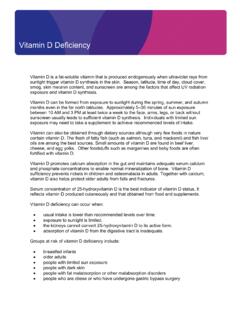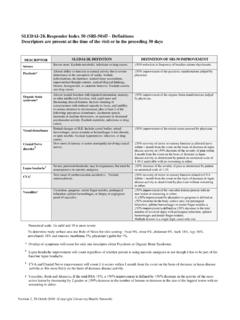Transcription of methotrexate gp guidelines 2008 - Royal National …
1 Upper Borough Walls Bath. BA1 1RL Telephone: 01225 465941 Facsimile: 01225 421202 DMARD MONITORING guidelines FOR GP INFORMATION methotrexate A. Indications: (Licensed): RA, Psoriasis. (Unlicensed): Psoriatic arthritis, Crohn s disease, connective tissue disease (SLE, myositis and vasculitis), Felty s syndrome. B1. Dosage Typical dose: 25mg ONCE weekly; starting dose may vary depending on the severity of the condition and patient characteristics such as age, renal function and other comorbid conditions. The initial dose may be 5 10 mg once weekly, increasing by 5mg every 2 6 weeks until disease stabilized. The maximum licensed dose in RA is 25 mg/week. Rarely, the maximum dose can be 30 mg/week. Lower doses should be considered for frail elderly patients who often have poor renal function.
2 B2. Folic acid supplements Typical dose: 5mg ONCE weekly, preferably the day after the methotrexate . Folic acid can be given any day as long as it is not on the same day as methotrexate . Folic acid reduces toxic effects and improves continuation of therapy and compliance. C. Route of administration: Oral, , or subcutaneous Oral (licensed): It is preferable to use only mg tablets and patients should be reminded of the need to check the dose and strength of the tablets with each prescription. Parenteral (licensed): The dose for parenteral use is usually the same as the oral. Folic Acid: Oral. D. Time to response: 6 weeks to 3 months methotrexate E. Cautions: (1) Patients with clinically significant renal impairment from any cause (2) Localized or systemic infection including hepatitis B or C and history of tuberculosis.
3 (3) Unexplained anaemia and/or cytopenia associated with marrow failure. F. Contraindications: (1) Pregnancy and breast feeding. (2) Suspected local or systemic infection. (3) Bonemarrow failure with unexplained anaemia and cytopenia. G. Notable drug interactions (refer to BNF and SPC) (1) Phenytoin: Antifolate effect of methotrexate is increased. (2) Probenecid, penicillin, NSAIDs: methotrexate excretion is reduced. (Clinically significant interaction between NSAID and methotrexate is rare). (3) Tolbutamide: Serum concentration of methotrexate may be increased. (4) Co-trimoxazole, trimethoprim: Antifolate effect of methotrexate is increased and greatly increases the risk of marrow aplasia. methotrexate J. Special clinical circumstances: (1) Alcohol: Any patient suspected of alcohol abuse is usually unsuitable for methotrexate therapy.
4 Rheumatologists should advise the patients receiving methotrexate to limit their alcohol intake well within National recommendations. (2) Hepatotoxicity: methotrexate related hepatotoxicity was first reported in psoriasis patients several decades ago. Liver biopsy: Current studies in patients with RA suggest that liver biopsies are not cost effective for at least the first 10 yrs of methotrexate use in patients with normal liver function value. Clinically serious liver disease (CSLD) is rarely seen in RA patients receiving low dose methotrexate and routine liver biopsies are therefore not recommended. (3) Pulmonary toxicity: methotrexate pneumonitis (MP) is a potentially fatal hypersensitivity reaction and is far less predictable than hepatic or haematological toxicity. It is most frequently but not exclusively seen within the first year of treatment.
5 Many studies suggest that the incidence of MP is much higher in patients with pre-existing lung disease. A persistent dry cough or shortness of breath may indicate development of pneumonitis. Stop the methotrexate and consult the specialist team or Casualty urgently. (4) Bone marrow failure: Significant fall in cell counts can occur as a result of methotrexate -induced bone marrow suppression. It is particularly likely in the elderly and in patients with significant renal impairment or in patients with concomitant administration of anti-folate drugs. If there is a significant fall in cell count stop methotrexate , consult the specialist team, medical on-call team or haematologist. However, in cytopenia due to Felty s syndrome, methotrexate might be a useful drug with good haematological outcome. (5) Pregnancy and breast feeding: All patients, male and female, should be advised against conception and pregnancy during treatment with methotrexate as it is an abortifacient as well as a teratogenic drug.
6 Breast feeding should not be allowed as the drug may be excreted in the breast milk. Patients should be advised to continue contraception for at least 3 months after stopping methotrexate . methotrexate (6) Surgical interventions: Two recent studies, one prospective randomized controlled, suggest that the continuation of methotrexate treatment does not increase the risk of infection or surgical complications in patients with RA . (7) NSAIDs: NSAIDs can be continued as long as monitoring is regularly undertaken. Special cautions need to be exercised if significant abnormalities are noted in liver enzymes. All patients should be regularly advised to avoid over the counter medications including aspirin and ibuprofen without the knowledge of the specialist team. (8) Infections: In contrast to many immunosuppressive therapies, methotrexate is relatively safe and has a low risk of infection associated with its use.
7 However, infections are still reported and such infections need to be diagnosed at an early stage to prevent systemic dissemination, and methotrexate should be stopped immediately. If infection is associated with dehydration and pre-renal failure, stop methotrexate and refer to the specialist team for possible folinic acid rescue. Significant mortality and morbidity can be associated with viral infections due to Herpes Zoster/Varicella. K. Immunization (1) Patients receiving methotrexate must not receive immunization with live vaccines. Inactivated polio is available although suboptimal response may be seen. (2) Annual flu vaccination is recommended. (3) In patients receiving methotrexate exposed to chickenpox or shingles, passive immunization should be carried out using VZIG. The Herpes Zoster immunoglobulins can be obtained from Health Protection Agency.
8 Tel. No: 020 8200 6868. Consultant: .. Telephone.













